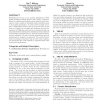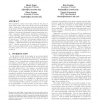WIKIS
2009
ACM
14 years 5 months ago
2009
ACM
Wikipedia has become a very popular destination for Web surfers seeking knowledge about a wide variety of subjects. While it contains many helpful articles with accurate informati...
HT
2009
ACM
14 years 5 months ago
2009
ACM
This paper develops a probabilistic framework that can model and predict group activity over time on online social media. Users of social media sites such as Flickr often face the...
CSE
2009
IEEE
14 years 5 months ago
2009
IEEE
—The growing popularity of social media in recent years has resulted in the creation of an enormous amount of user-developed content. While information is readily available, ther...
HT
2010
ACM
14 years 5 months ago
2010
ACM
Today, there is significant sharing of information artifacts among users on various social media sites, including Digg, Twitter and Flickr. An interesting consequence of such ric...
W4A
2009
ACM
14 years 7 months ago
2009
ACM
The popularity of social media is affecting society as they are changing the way communication, collaboration, interaction, and information are produced and consumed. A part of t...
GROUP
2009
ACM
14 years 7 months ago
2009
ACM
Increasingly, large organizations are experimenting with internal social media (e.g., blogs, forums) as a platform for widespread distributed collaboration. Contributions to their...
GROUP
2009
ACM
14 years 7 months ago
2009
ACM
As organizations scale up, their collective knowledge increases, and the potential for serendipitous collaboration between members grows dramatically. However, finding people wit...
CIKM
2009
Springer
14 years 7 months ago
2009
Springer
The study of collective behavior is to understand how individuals behave in a social network environment. Oceans of data generated by social media like Facebook, Twitter, Flickr a...
CSE
2009
IEEE
14 years 7 months ago
2009
IEEE
This article addresses a question regarding relevant information in a social media such as a wiki that can contain huge amount of text, written in slang or in natural language, wi...
SIGMOD
2009
ACM
14 years 7 months ago
2009
ACM
User generated content and social media (in the form of blogs, wikis, online video, microblogs, etc) are proliferating online. Grapevine conducts large scale data analysis on the ...


